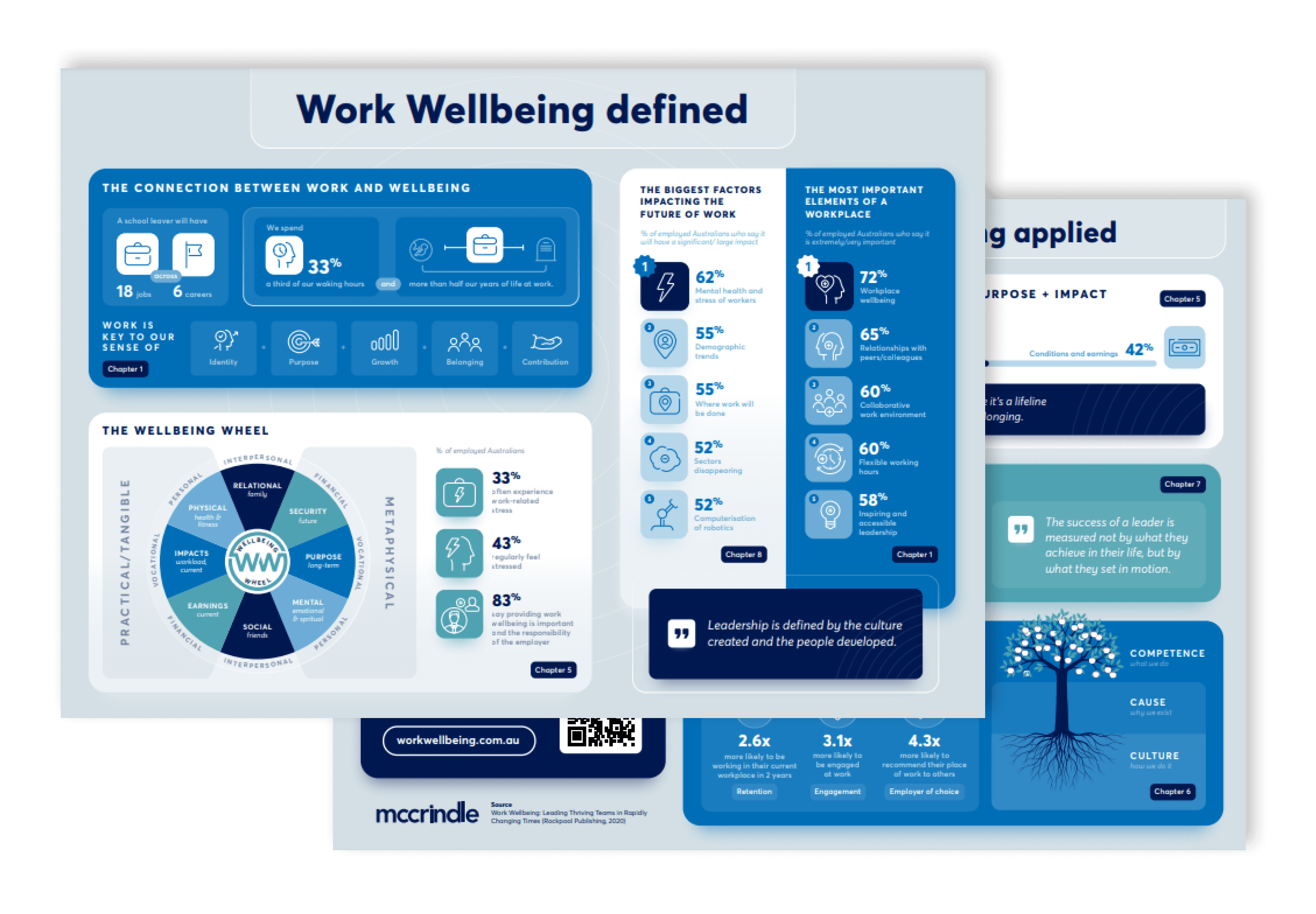Work Wellbeing
Why mental health and wellbeing are key to the future of work

Individual wellbeing is a goal people are always striving towards. As work comprises such a big part of life it is a significant contributor to it. Workplace wellbeing was the top-ranked element in a place of employment, with 72% of workers in our worker survey saying it is extremely/very important to them. Work can also have an impact on mental health, with 43% of workers always or often feeling stressed in life, and 79% of those admitting it is work-related.
There are many reasons why work wellbeing (the attitude of valuing employees embedded into the culture of an organisation) needs to be at the top of the agenda of workplace leaders. People face significant health concerns from being overworked and stressed, which not only impacts people’s personal health and ability to thrive, it also leads to increased turnover, impaired productivity and engagement with their job. All of these issues will not only affect an organisation’s ability to perform well but can be a significant inhibitor to people’s personal wellbeing.
Mental health and wellbeing are key to the future of work
In our survey of Australian workers, we asked about what trends will most impact the future of work. Of the seven factors we tested, ‘mental health and stress of workers’ was the one most workers believed would have the most significant impact (62%). This was above demographic trends, the physical workspace and where work will be done, sectors disappearing, computerisation of robotics, global workforce trends and the gig economy.
So if you’re feeling exhausted from a big year of change – know that that’s ok and take the necessary time to invest in your own wellbeing. This could simply take the form of getting better (or more!) sleep, speaking with someone about the challenges you are facing, investing into your physical or spiritual health or taking a much-needed break from work. It’s ok to prioritise your personal wellbeing – it’s not only key to your own future but for the wellbeing of those around you. Bringing our best self to work is one of the greatest gifts we can give to ourselves and our colleagues, students and our community.
Build a culture of prioritising wellbeing
In our national survey of 1,160 workers, more than one in five (22%) said the main reason they left their previous employment situation was because of the work-life balance (or the lack thereof). For many employees, work and life, or work and rest, have become more blurred than ever.
The term ‘work-life balance’ is a concept used to distinguish between work responsibilities and other aspects of our personal wellbeing such as the social, relational, spiritual or financial. But as work continues to permeate other areas of our life, a new term is replacing that of the work-life balance equation. And that’s work-life integration. This term helps us to see that work and life are ideally not in competition, but that our ‘at work’ life and our ‘away from work’ life are both key to our contributions, relationships and fulfilment.
While COVID-19 posed many challenges, it also provided a unique opportunity to recalibrate a focus on wellbeing. Those who can take this focus on wellbeing and build it into the culture will make a positive impact on themselves and their staff. This might translate to encouraging people to take regular breaks from work, finish on time, draw healthy boundaries or prioritise aspects that make their work enjoyable and sustainable.
Regularly remind yourself (and your team) of the organisation’s purpose
Rather than viewing work as a separate part of life, or simply an obstacle to overcome, work is an important and significant part of our life. After all, people work for more than just remuneration. According to our national survey of 1,001 workers, 63% said work is extremely/very important to a having a sense of purpose. Workers also said work is extremely or very important to developing them as a person (59%), making a difference in the lives of others (58%), bettering society and the world (55%) and contributing to a sense of community and belonging (54%).
Today people see less differentiating between work-life and out-of-work-life, or one’s job and one’s personal values. In response, leaders who can regularly communicate the organisation’s purpose to themselves and others will likely be more motivated and inspired to do their best work, and for work to enhance their wellbeing rather than inhibit it.
The world of work is changing – from demographic shifts to technological advancements and a global pandemic. COVID-19 has simply increased the recognition that the health, social connection and purpose – wellbeing – is an essential factor that will impact and define the future of work. Workplaces need to adapt and respond, so that workers are looked after while also being stretched and grown in capacity, and all in an environment in which they can flourish and thrive.







